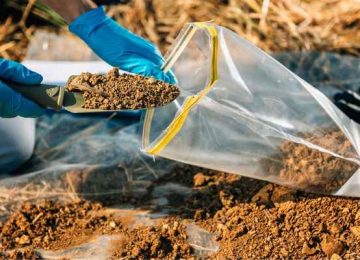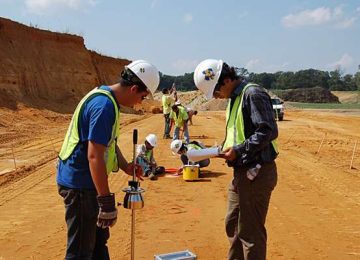

Soil & Geotechnical Testing Services
Soil testing is performed to determine the physical and chemical properties of soil. The main purpose of soil testing is to determine the suitability of soil for construction, agriculture, and other uses. Soil tests measure various characteristics such as soil composition, pH, moisture content, compaction, and strength. The results of soil tests are used to make decisions about site preparation, foundation design, and other aspects of construction and land use.
Geotechnical testing is performed to assess the physical and mechanical properties of soil and rock. The main purpose of geotechnical testing is to provide information about the behavior of soil and rock in response to various loads and conditions, such as construction activities, earthquakes, and other natural and man-made events. Geotechnical tests measure various characteristics such as soil composition, permeability, compression strength, shear strength, and modulus of elasticity. The results of geotechnical tests are used to make decisions about site preparation, foundation design, slope stability, and other aspects of construction and land use.
Soil & Geotechnical testing is performed by geotechnical engineers and laboratory technicians using specialized equipment and techniques.
Agricultural Soil Testing
In agriculture, a soil test commonly refers to the analysis of a soil sample to determine nutrient content, composition, and other characteristics such as the acidity or pH level. A soil test can determine fertility, or the expected growth potential of the soil which indicates nutrient deficiencies, potential toxicities from excessive fertility and inhibitions from the presence of non-essential trace minerals. The test is used to mimic the function of roots to assimilate minerals.
What We Offer
Soil Physical Testing
Particle size distribution: This measurement determines the proportion of different size particles present in the soil, including sand, silt, and clay.
Moisture content: This measurement determines the amount of water present in the soil, which affects the soil’s strength and compressibility.
Dry density: This measurement determines the density of the soil when it is dry, which is an indicator of the soil’s compaction and strength.
Atterberg Limits: These measurements determine the consistency of the soil, including its plasticity and shrink-swell properties.
Permeability: This measurement determines the ability of the soil to allow water to pass through it, which affects the soil’s suitability for construction and other uses.
Shear strength: This measurement determines the maximum force that the soil can withstand before it fails in shear, which is important for evaluating slope stability and other factors.
Soil Chemical Testing
pH: This measurement determines the acidity or alkalinity of the soil, which affects the growth of plants and other organisms.
Cation Exchange Capacity (CEC): This measurement determines the soil’s ability to hold and exchange positively charged ions, such as calcium, magnesium, and potassium.
Total Nitrogen (TN): This measurement determines the amount of nitrogen present in the soil, which is an important nutrient for plants.
Organic Matter (OM): This measurement determines the amount of organic matter present in the soil, which affects the soil’s fertility and structure.
Available Phosphorus (P): This measurement determines the amount of phosphorus available in the soil, which is another important nutrient for plants.
Electrical Conductivity (EC): This measurement determines the ability of the soil to conduct electricity, which is an indicator of the soil’s salinity and fertility.
- Pesticide Analysis : This measurement determines the ability of the soil to conduct electricity, which is an indicator of the
Soil Microbiological Testing
- Total Coliforms : APHA 23rd Edition 2017- 9221 B or IS 1622: 1981, Clause 3.3 Amd.1-4: (RA 2019)
- Escherichia coli : APHA 23rd Edition 2017- 9221 F or IS 1622: 1981, Clause 3.3 Amd.1-4: (RA 2019)
- Thermotolerant (Fecal coliform) : APHA 23rd Edition 2017- 9221 E or IS 1622: 1981, Clause 3.3 Amd.1-4: (RA 2019)
- Total bacterial Count : IS 5402:2012: (RA 2018)
- Detection of Salmonella spp. : IS 5887 (Part-3) Sec.1: 2020: Amd. 1
- Detection of Shigella spp. : IS 5887 (Part- 7): 1999 (RA 2018)
- Detection of Staphylococcus aureus : IS 5887 (Part- II): 1976 (RA 2018)
Geotechnical Testing
- Geotechnical Analysis


